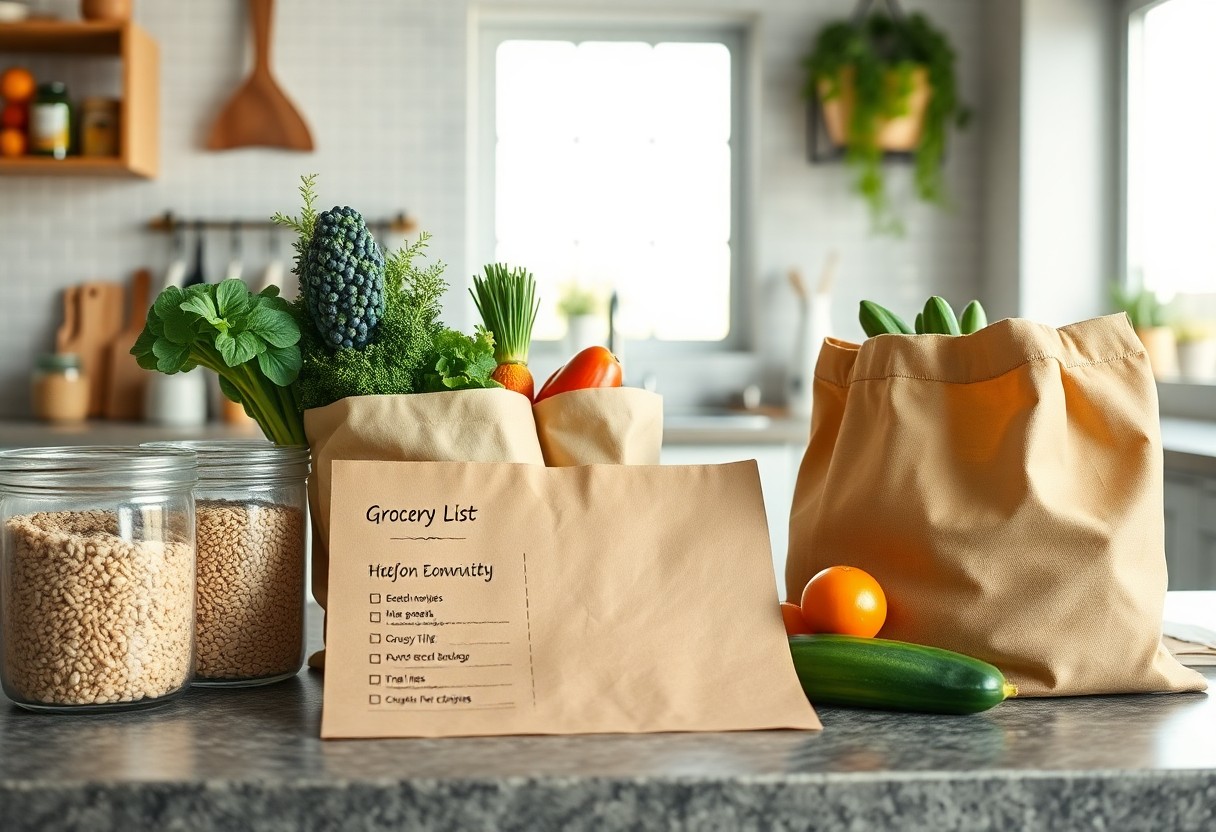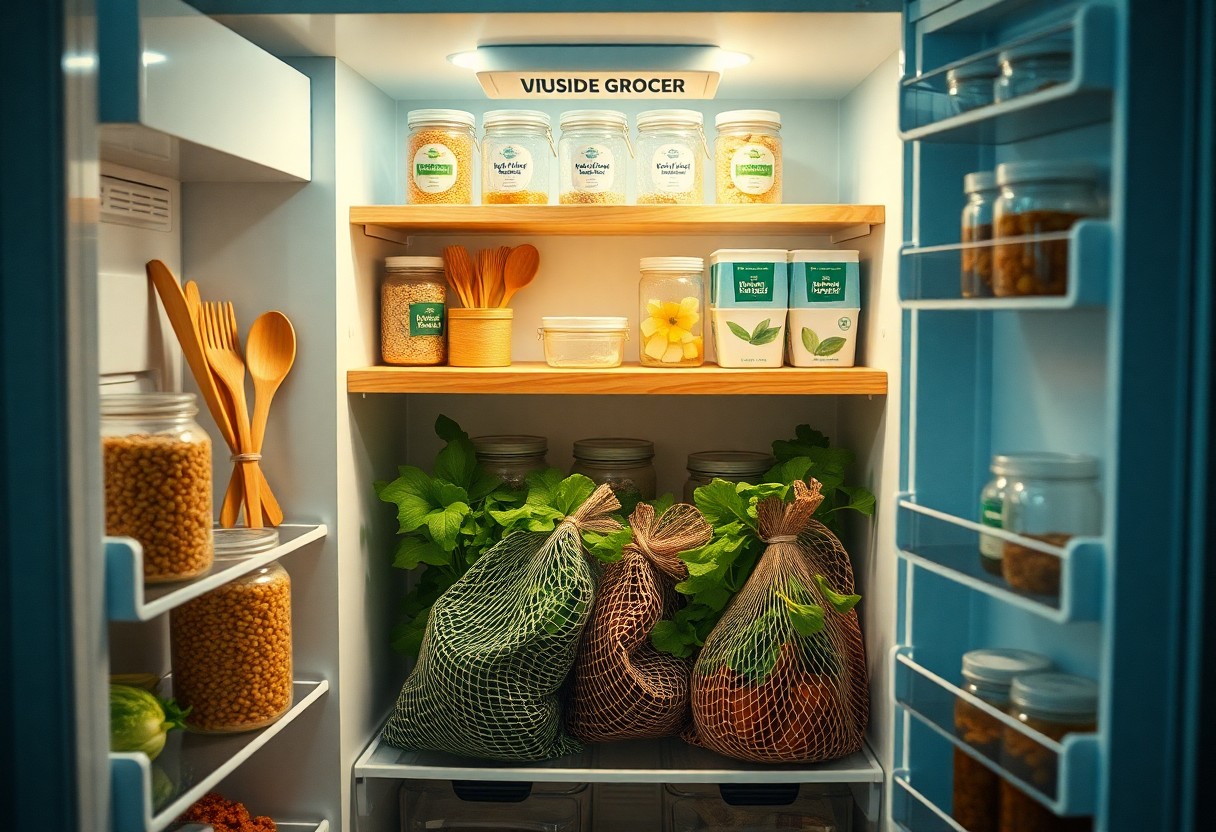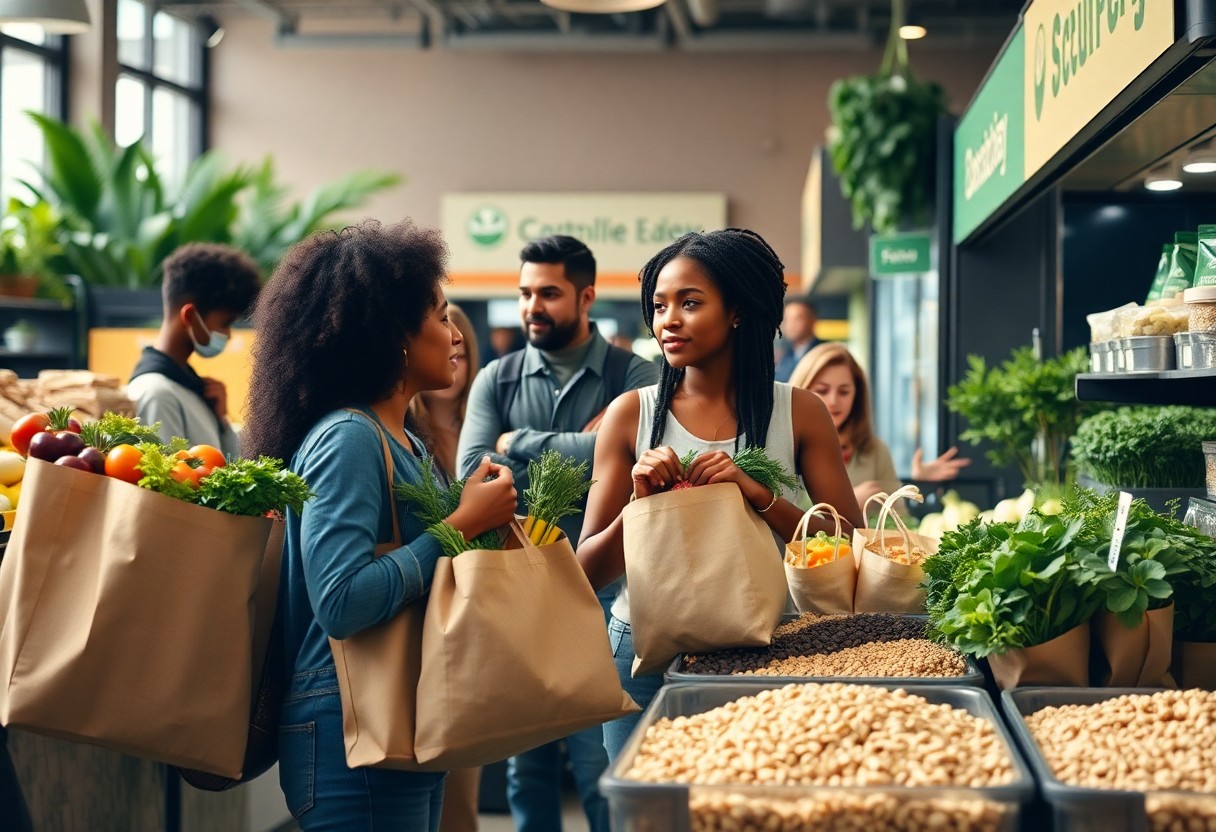Just a few simple adjustments can transform your grocery shopping habits into a more sustainable experience. You can significantly reduce waste, avoid plastic packaging, and support eco-friendly practices without complicating your routine. By choosing local products, utilizing reusable bags, and planning your meals effectively, you can contribute to a healthier planet. For further insights, check this helpful discussion on Is Sustainable Grocery Shopping Possible? : r/ZeroWaste.
Understanding Eco-Friendly Grocery Shopping
Eco-friendly grocery shopping involves making conscious choices to minimize your environmental impact while fulfilling your dietary needs. By selecting sustainably sourced products, supporting local farmers, and reducing plastic usage, you contribute to a healthier planet. This approach not only positively influences your lifestyle but also encourages brands and suppliers to adopt greener practices. Discovering new eco-friendly products and revising your shopping habits can seamlessly integrate into your routine.
Benefits of Sustainable Shopping
Choosing sustainable shopping is beneficial for both your health and the environment. Organic products often contain fewer pesticides, leading to safer food for you and reduced chemical runoff into ecosystems. Supporting local businesses also strengthens community ties and promotes economic sustainability. By prioritizing eco-friendly options, you align your values with your purchasing decisions, fostering a more responsible consumption model and inspiring others to follow suit.
The Impact of Plastic Waste
Plastic waste poses a severe threat to ecosystems, wildlife, and human health. The production of plastic generates significant greenhouse gas emissions, and once discarded, plastic can take hundreds of years to decompose. In oceans, it breaks down into microplastics, which are ingested by marine life, entering the food chain and ultimately affecting you. Reducing your reliance on plastic bags and containers during grocery shopping can significantly lessen your contribution to this problem.
Globally, about 300 million tons of plastic are produced annually, with over 8 million tons ending up in oceans each year. This plastic not only harms aquatic life but also disrupts entire marine ecosystems. Wildlife that ingest or become entangled in plastic face dire consequences, leading to decreased biodiversity. Beyond environmental destruction, microplastics have infiltrated the food chain, detected in seafood and even drinking water. Embracing sustainable practices, such as using reusable bags and avoiding single-use plastics, directly combats this pervasive crisis while promoting a healthier planet.

Planning Your Grocery List
Effective grocery shopping starts with a well-thought-out list, helping you avoid impulse buys and excess waste. Jot down importants based on your weekly meals and consider pantry staples that promote sustainability. Aim for products with minimal packaging and opt for bulk items to reduce plastic usage. A thorough list allows you to shop with purpose, ensuring you make eco-friendly choices while saving time and money.
Seasonal and Local Produce
Choosing seasonal and local produce cuts down on transportation emissions and supports regional farmers. When you buy in season, you not only enjoy more flavorful options but also contribute to a reduced carbon footprint. Look for farmers’ markets or local co-ops where you can find fresh fruits and vegetables that are ripe and ready for consumption.
Plant-Based Choices
Incorporating plant-based choices into your grocery list significantly lowers your environmental impact. By prioritizing fruits, vegetables, grains, and legumes over meat and dairy, you reduce greenhouse gas emissions associated with livestock production. For instance, choosing beans over beef can save over 1,000 gallons of water per pound.
Exploring plant-based options opens a world of nutritional benefits while promoting sustainability. Substituting just a few meals a week can impact your health and the planet. Lentils, chickpeas, and quinoa are versatile staples that provide protein and fiber with minimal environmental cost. Experiment with recipes that highlight seasonal produce to keep your meals fresh and exciting while reducing reliance on animal products.

Sustainable Packaging Options
Opting for sustainable packaging significantly reduces your environmental footprint. Look for products packaged in recyclable, biodegradable, or compostable materials. Many grocery stores now offer packaging-free alternatives, allowing you to minimize waste while shopping. Consider products in glass containers or those that use plant-based plastics as greener options. By consciously choosing sustainable packaging, you can contribute to a circular economy and inspire others to follow suit.
Bulk Bins and Reusable Bags
Shopping from bulk bins allows you to buy only what you need and significantly cut down on packaging waste. Bring your reusable bags and containers to fill up on grains, nuts, and snacks, often at a lower cost as well. Many stores encourage this practice by offering discounts for bringing your own packaging, making it a win-win for both your wallet and the environment.
Eco-Friendly Brands
Supporting eco-friendly brands enables you to purchase products that prioritize sustainability in their operations. Seek out companies committed to using renewable resources, ethical sourcing, and eco-conscious practices. These brands often have transparent supply chains and environmental certifications, making it easier for you to make responsible choices.
Many eco-friendly brands have made it their mission to not only reduce their environmental impact but also raise awareness among consumers. For instance, companies like Seventh Generation or Method utilize plant-based ingredients and aim for minimal packaging waste. By choosing products from these brands, you can support innovation in sustainability while ensuring that you’re not merely buying greenwashed goods. Paying attention to certifications like Fair Trade or USDA Organic helps you identify genuinely eco-conscious options, encouraging you to make informed purchases that align with your values.
Choosing the Right Grocery Store
Evaluating your grocery store options can significantly enhance your eco-friendly shopping experience. Look for establishments that prioritize sustainability, such as those that implement green practices, source local produce, and minimize their ecological footprint. By choosing stores that align with your values, you support businesses investing in a healthier planet while making it easier to find environmentally conscious products.
Local Farmers Markets
Shopping at local farmers markets not only supports community agriculture but also reduces the carbon footprint associated with transporting food. You’ll find fresh, seasonal produce and often organic options, all without the excess packaging typically found in grocery stores. Building relationships with local farmers can also lead to a greater understanding of where your food comes from and how it’s produced.
Stores with Sustainable Practices
Identifying stores with sustainable practices can simplify your eco-conscious shopping. Many retailers now integrate energy-efficient systems, reduce food waste, and offer bulk purchasing options to minimize packaging. Look for certifications or labels that indicate commitment to sustainability, such as B Corp certification or memberships in sustainability organizations.
Stores focused on sustainability often implement a range of initiatives that directly benefit the environment. For example, some chains have adopted renewable energy sources, significantly reducing their reliance on fossil fuels. Others actively participate in waste reduction programs, diverting a significant percentage of waste from landfills through composting and recycling. Additionally, many grocery stores are prioritizing local and organic products, which not only supports farmers but also ensures you get fresher, more nutritious food while reducing harmful pesticides and fertilizers commonly found in industrial farming. Your shopping choices can directly influence these practices and encourage more stores to adopt eco-friendly measures.
Reducing Food Waste
Implementing strategies to reduce food waste not only conserves resources but also saves you money. By planning meals, buying only what you need, and practicing proper food storage, you can minimize the amount of food that ends up in the trash. AS much as 30-40% of the food supply is wasted in the U.S.; acknowledging this issue encourages you to take action. Perceiving food waste as a challenge rather than a norm can lead to innovative solutions and more sustainable habits.
Meal Prep Tips
Meal prepping not only streamlines your cooking process but also helps combat food waste effectively. Start by planning your week’s meals based on what’s currently in your pantry and fridge. Make a detailed shopping list to avoid over-purchasing. Batch cooking allows you to use seasonal produce efficiently, while proper storage in reusable containers keeps meals fresh for longer. Incorporate these tips into your routine to stay organized and reduce waste.
- Plan meals ahead of time.
- Buy only necessary items.
- Batch cook and portion out meals.
- Store food in reusable containers.
Creative Leftover Ideas
Transforming leftovers into new dishes can be both fun and rewarding. Create a plan for what to do with excess ingredients, like turning roasted vegetables into a hearty soup or transforming stale bread into croutons. You can also make a smoothie from overripe fruits or use leftover grains in salads. This creativity not only reduces waste but initiates a craft in the kitchen, encouraging sustainable practices.

Staying Informed and Engaged
Being informed and engaged in eco-friendly grocery shopping enhances your ability to make sustainable choices consistently. Following reputable sources, such as environmental organizations and sustainability blogs, keeps you updated on new products, policies, and practices. Participating in local forums or social media groups focused on sustainable living can foster discussions and exchange practical tips with like-minded individuals, enriching your shopping experience.
Supporting Sustainable Products
Choosing to support sustainable products directly impacts the environment and local economies. Look for items with certifications like USDA Organic, Fair Trade, or B Corp, which ensure adherence to environmentally friendly practices. Local farmers’ markets often feature products grown without harmful chemicals, providing fresh options while reducing transportation emissions.
Educating Yourself and Others
By educating yourself on sustainability, you empower those around you to make informed choices as well. Delve into documentaries, books, and podcasts that discuss environmental issues and solutions. Sharing this knowledge can spark conversations that influence friends and family to reconsider their shopping habits, creating a ripple effect towards a more sustainable lifestyle.
Educating yourself and others can significantly shift community perspectives on sustainability. For instance, organizations like the Environmental Working Group publish annual guides on pesticide contamination in produce, allowing you to make informed choices. Hosting informal gatherings or discussions can foster collective awareness about issues like plastic pollution or the benefits of plant-based eating. When you share insights on shopping sustainably, you inspire action, leading everyone to contribute to a healthier planet.
To wrap up
The choices you make while grocery shopping can significantly impact the environment. By opting for bulk items, reusable bags, and seasonal produce, you can effectively reduce waste and avoid plastic. Educating yourself on sustainable practices will streamline your routine and enhance your shopping experience. For more detailed suggestions, consult the Sustainable Grocery Shopping Starter Pack: 12 Simple Tips to help you transition towards a more eco-friendly lifestyle.
FAQ
Q: How can I reduce waste while grocery shopping?
A: Bring reusable bags, produce bags, and containers to avoid single-use plastics. Plan your meals to minimize excess purchasing and rely on bulk bins where possible. Choose products with minimal or recyclable packaging.
Q: What alternatives can I use to avoid plastic packaging?
A: Opt for items from bulk bins, purchase fresh produce without packaging, and select brands that use glass or compostable materials. Consider shopping at farmers’ markets for loose items and choosing local products.
Q: How can I make sustainable choices without complicating my shopping routine?
A: Create a shopping list focused on seasonal, local, and organic items that align with your values. Stick to familiar stores that offer eco-friendly options, and gradually incorporate sustainable brands into your purchases.
Q: Are there any specific products that are particularly eco-friendly?
A: Look for products certified as organic, fair trade, or labeled with sustainability certifications. Choose items made from recycled materials, plant-based cleaning products, and organic produce to support sustainable practices.
Q: How can I educate myself about sustainable grocery shopping?
A: Research online resources, follow sustainability blogs, and connect with local eco-friendly communities. Attend workshops or webinars that focus on sustainable living and participate in forums to share tips and advice with others.